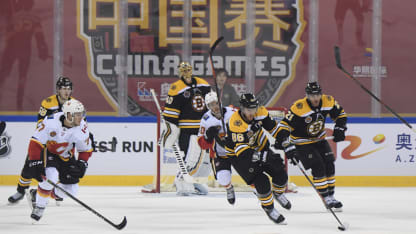NHL to prioritize international growth of game, Daly says in Q&A
Commissioner discusses future of Global Series, China Games, World Cup with NHL.com

© Brian Babineau/Getty Images
The NHL Deputy Commissioner does not see the League expanding for the foreseeable future, now that the Seattle Kraken will become the NHL's 32nd team this season after the Vegas Golden Knights became its 31st in 2017-18.
But he sees the NHL increasing its commitment to playing games overseas, staging international events and investing in grassroots programs as soon as it can considering the COVID-19 pandemic.
Daly said the NHL had hoped the Colorado Avalanche and Columbus Blue Jackets could play two regular-season games in Helsinki in early November in the NHL Global Series and waited as long as possible before deciding against it due to the COVID-19 situation.
NHL players will participate in the 2022 Beijing Olympics in February in the first best-on-best international tournament since the World Cup of Hockey 2016 in Toronto.
At the NHL/NHLPA Player Media Tour in Chicago this week, Daly told NHL.com International the League has discussed playing in Russia and likely will discuss it again soon, and he said several teams have expressed interest in playing in Mexico.
Daly discussed Seattle, the Olympics, the China Games, the Global Series and the World Cup in an interview with NHL.com:
What is your level of enthusiasm for Seattle's debut?
"High. The team's done everything right in terms of building the fan base and engaging with the community. They've opened their practice facility, which you might consider remarkable if you saw the practice facility when we did in mid-July. They have a lot of fans in the building interested in watching captain's skates, basically, because they're not really allowed to train yet. It's going to be everything we thought it was going to be and more."
Is the NHL done with expansion for the foreseeable future?
"I would think so. We're comfortable with 32 [teams]. There are other markets who are interested in having NHL franchises, but the expansion equation has changed over time in every league, but particularly our league. The equation is, 'Is the addition of the franchise good for the League? Does it help grow the League?' As opposed to the short-term financial benefits associated with expansion. That's not what's in our owners' heads at this point in time. I think both in Vegas' case and Seattle's case, they favorably received those franchises as being beneficial to the overall business of the League."
The NHL's position on the Olympics has been that it disrupts the season, particularly when not held in North America. That's why the League did not go to the 2018 PyeongChang Games. The League agreed to go to Beijing as part of the negotiations with the NHL Players' Association last year to extend the collective bargaining agreement through 2025-26, pending an agreement with the International Ice Hockey Federation. Now that the NHL is going to Beijing, what is your view?
"We made a commitment to go to the Olympics. We stand behind that commitment. We're going to make the best of it. It's going to be a fabulous tournament, the best hockey players in the world, best-on-best format, on the Olympic stage. We've openly acknowledged there are benefits to that, expanding the viewership of our game and played at the highest level. So, you know, look, we want to go into Beijing and the Beijing Olympics and the experience in a positive way, and everything we do this year will be geared toward making it as positive an experience as it can be."
The NHL played preseason games in Shanghai and Beijing in 2017 and Shenzhen and Beijing in 2018 in the NHL China Games. One reason was the Chinese government's interest in promoting hockey ahead of the Beijing Olympics. After the Beijing Olympics, will it be less urgent for the NHL to play in China? What is the NHL's future there?
"I don't think it's less urgent. I think we continue to view growth of the game in China to be a priority for our international expansion. How you do that, how you break into that market, how you make people who aren't used to the game fans of the game, those all continue to be challenges. But it's a large market with a large number of people, and we still think there's a benefit to exposing our sport at its highest level in China. Beijing will be a big part of that, but we've also made a commitment to grassroots hockey in China and investing in that, and I expect that to continue."
Do you expect more NHL games in China in the near future?
"The answer is yes. I don't know whether we're talking regular season. To this point, it's been preseason games. I do expect beyond Beijing that NHL teams will return to China, will play games again there, probably at first preseason."
The NHL has played eight regular-season games in Europe since 2017 in the NHL Global Series. What is the future of that event?
"That's going to be a regular part of our calendar going forward and probably an increased part of our calendar going forward just in terms of where we play games and what we're prioritizing and how we're strategizing. I think the games we've brought over in recent years have been very, very well received, probably at a much higher level than the games earlier on when we played in Europe, so I expect that to continue.
"I know there's an appetite for it. We tried to preserve a Global Series game opportunity for this season and we kept it on the burner until the very last minute before we had to make a decision and we had to pull it. But I certainly expect it to be a part of next year's calendar for sure."
The NHL and NHLPA have not staged a World Cup of Hockey since 2016. What is the future of that event?
"Excited that the Olympic opportunity put the World Cup back on the radar. Had a conversation with [NHLPA executive director] Don Fehr, I think, two weeks ago. The Players' Association is focused on sitting down and working out a plan for the next World Cup and making it into a regular event.
"Not only is it best-on-best, but it's a tournament we can control, we can make decisions on and we can direct. That's a huge benefit both from a revenue standpoint but also from a competition standpoint. I talked [recently] to one of the Swedish decision-makers, and he asked about the World Cup. We talked about potentially getting the European countries together sometime this fall to talk about the next World Cup."

















